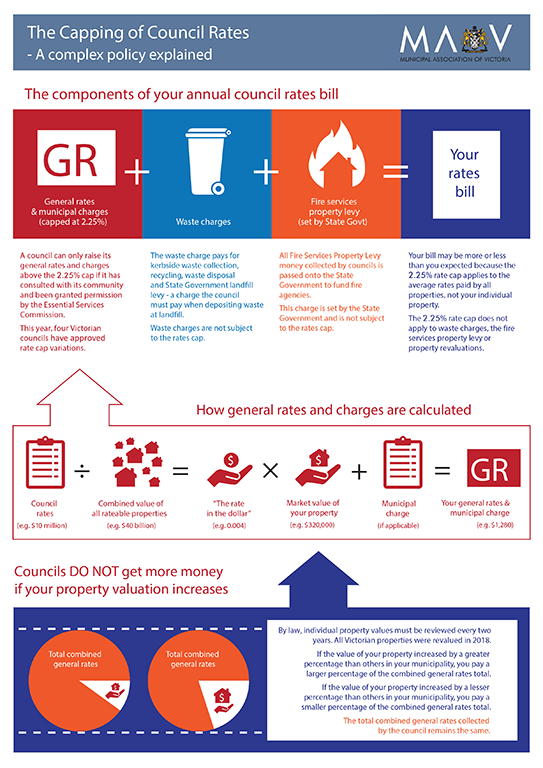Rate capping

Campaign objective
The current State-imposed rate cap commenced in 2016. Councils have implemented numerous business efficiency reforms, such as internal restructures, asset sales, collaborative procurement and a reduction in fleet vehicles.
However, evidence is emerging of a worrying under-investment in capital infrastructure, and councils choosing to opt out of discretionary community services due to budget constraints.
Under a State rate cap regime, we seek:
- clear flexibility within the model to reflect different revenue raising capacities of councils so that no community is left behind
- an appropriate rate cap indexation model that incorporates both CPI and council input costs to deliver community services.
About rate capping
Victorian local government unanimously opposed Victorian Labor's rate capping policy, which requires councils to apply to the Essential Services Commission if they want to raise rates above CPI.
Councils are a distinct tier of government with democratically elected councillors to make decisions on behalf of the community. The autonomy of councils must be respected and councils must retain the flexibility to set appropriate budgets that meet local community priorities and needs. A legislated process already provides that councils make budget decisions in an open, transparent and accountable way that involves community input.
Rate capping in Victoria in the 1990s resulted in councils deferring spending on capital programs such as roads maintenance and renewal. This led to faster deterioration of roads and other assets, and has consequently imposed higher costs on future generations of ratepayers to renew and upgrade under-maintained community infrastructure.
The $225 million asset renewal gap identified by the Auditor General in 2012 is due to council-owned assets deteriorating faster than councils can fund their maintenance, renewal and replacement. This is projected to grow to $2.6 billion by 2026, and under a rate cap, will result in a long-term devastating impact on the quality and availability of local roads and community facilities across Victoria.
Our advocacy
- MAV response - Local government bill exposure draft (21 Mar 2018)
- Submission on Local Government Bill Exposure Draft (Word - 353KB) (Mar 2018)
- State Election 2018 advocacy (Oct 2018)
- Parliament urged to oppose reforms that will hurt communities (19 Jun 2018)
- Equal access to local services needed for all Victorians (27 Jun 2018)
- MAV presents at rate capping inquiry hearing (7 Sep 2017)
- Rate cap double standard sets councils on path to service cuts (19 Dec 2016)
- Rate capping advocacy (5 Aug 2016)
- Rate capping - what the Government didn't tell you (30 Jun 2016)
- Response to Parliamentary Inquiry into Rate Capping report - media release (7 Jun 2016)
- MAV response to ESC rate cap variation decisions (31 May 2016)
- Inquiry told cap on rates will hurt those who can least afford it (10 Mar 2016)
- Councils look to reverse State cost shifting - media release (15 Feb 2016)
- Rate cap = Short term gain + longer term pain - media release (22 Dec 2015)
- First rate capping report released (10 Dec 2015)
- Rate capping legislation passed in Victorian Parliament (4 Dec 2015)
- State property taxes rise, dark side of rate capping revealed - media release (20 Oct 2015)
- Submission to ESC draft Rates Capping and Variation Framework (2 Sep 2015)
- Councils work hard to keep rates low - media release (24 Jul 2015)
- MAV Submission to Rate Capping Inquiry (16 Jul 2015)
- New Fair Go Rates Reference Group (4 Jun 2015)
- Regular review into ongoing impact of rate capping welcome - media release (28 May 2015)
- Essential Services Commission rate capping submission (28 May 2015)
Further information
- Find out about the Victorian Government's rate capping framework (external link)
